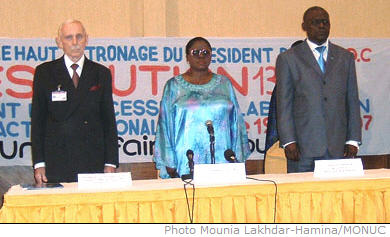Wednesday September 19 2007 marked the official launch in Kinshasa’s Grand Hotel of UN resolution 1325 in the DRC, entitled "Women, Peace and Security." The resolution envisages an action plan aimed at empowering women in order to have gender equality and a durable peace, where there is no impunity for sexual violence and other human rights violations against women. 
Resolution 1325 puts the focus on implicating women in decision making at all levels of society, whether in peace, conflict or post conflict situations.
Those present at the launch included the DRC Minister of the Interior Dennis Kalume, the DRC minister for Women and the Family Philomène Omatuku, the UN Special Representative of the Secretary General for the DRC William Swing, UN agency representatives, DRC government officials, foreign ambassadors and national and international NGO representatives.
On behalf of the UN agency system in the DRC, Mr. Swing said that the launch was the result of two processes.
“Firstly, the resolution is a work of analysis of the real situation of women in peace, conflict and post-conflict situations. Secondly, this important resolution is the outcome of intense consultations from bottom to top, then to regional level and finally on a worldwide scale.”
William Swing appealed for an immediate stop to all forms of violence against women in the DRC, and pleaded for concrete action which would protect women and improve their situation.
He put a particular focus on the issue of sexual violence which he said was “a cancer in the nation.”
“The integration of this issue is not a political option but rather a moral obligation to undertake for all actors, whether they are state-controlled, non state-controlled, the United Nations, or partners of the international community,” he added.
For Mr. Swing, the plan of action must be elaborated in close collaboration with all actors in the domain of development from bottom to top, in order to take into account the situation of women in the process of instituting a lasting peace in the DRC.
“It is necessary to examine the laws to insure that they don’t discriminate against women, and that the laws guarantee equality between men and women, where everybody’s rights to security are assured,” he said.
The DRC Minister for Women and the Family, Philomène Omatuku, said the situation of women in the DRC is of concern, and all decision-makers should pay attention to this, notably in the economic arena where women are often far poorer than men.
She also cited “rising mortality and illiteracy, non schooling of girls, low numbers of women in decision making positions and in employment, and sexual and other violence against women, despite the fact that 80% of the population survives thanks to the efforts of women in the casual sector.”
The Minister also announced the holding, on 25 November 2007, of the first National Solidarity Congress for Congolese women, which will unite more than 2,000 women from the whole country under the theme “Gender Equality, Feminization of Aids and No to Violence against Women.”
Minister Dennis Kalume thanked all actors in the process, and recognized the merit of resolution 1325 in favour of Congolese women which will serve as “a political reference document for everything concerning gender in the DRC.”







